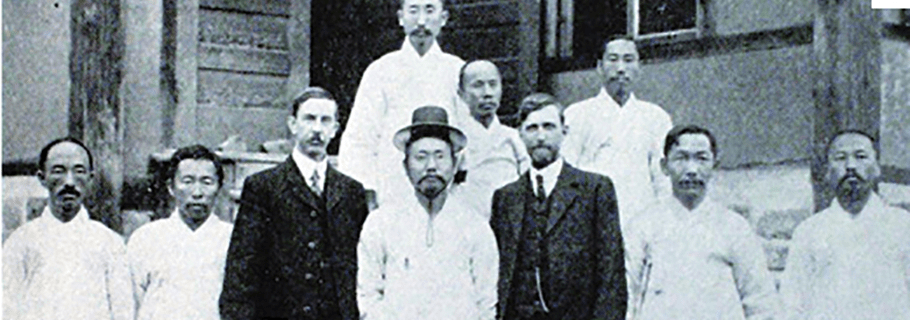Today I bring you the second in a series of articles by Joel Kim, President of Westminster Seminary California. Once again he reflects on the Olympics from a Korean perspective.
“The Pyongyang Olympics” is how some are referring to the PyeongChang Winter Olympic Games. This can be a humorous play on words, drawing our attention to the similarity of the two names. But for most, the phrase sums up the attention that North Korea has received at the Olympics. Like the recent Wall Street Journal editorial, the focus on the North Korean team, cheerleaders, and the attendance of the sister of the North Korean leader, all divert attention from South Korea, the sufferings of the North Korean people, and the atrocities committed by the government of North Korea. “Pyongyang” as the capital of this oppressive regime symbolizes dictatorship, human-rights violations, and suffering.
Pyongyang was considered “the Jerusalem of the East,” a model of success for missions and the center of a growing Christianity in Korea.
This was not always the case. It might be difficult to imagine a time when the city and the name “Pyongyang” meant something entirely different. Only a century ago and before Korea was divided into two, Pyongyang was considered “the Jerusalem of the East,” a model of success for missions and the center of a growing Christianity in Korea.
Let me share with you a few historical events that make Pyongyang such an important city in the history of Korean Christianity.
First, Pyongyang was the site of a number of Christian schools, including the first Presbyterian seminary in Korea. The Presbyterian Theological Seminary of Pyongyang began in 1901 with only two students meeting in the guest room of Samuel A. Moffett, a Presbyterian missionary, who went on to serve the school as president and professor until 1935. By 1905, there were over 40 students engaged in a five-year curriculum which included three months of classroom instruction and nine months of practical ministry engagement in local churches. Seven students finished their studies in 1907, marking a new beginning for the Presbyterian churches and Korean Christianity. Despite closing its doors under pressure during the Japanese occupation of Korea in 1938, its importance to the history of Korean Christianity is not forgotten as a number of Presbyterian and Reformed seminaries in South Korea see themselves as heirs of the Pyongyang seminary.
Second, this is the location of the Revival of 1907, often called “The Pyongyang Revival.” After the arrival of the first Western missionaries to Korea in 1885, the church in Korea grew rapidly in the following decades, numbering over 200,000 followers by 1910. It might surprise some of us to know that two-thirds of these believers were Presbyterians or Methodists, the denominations of the first two Western missionaries, and that most of these believers were in what is now a part of North Korea. Although many reasons contributed to this, historians point to the importance of the Pyongyang Revival which began at Jangdaehyeon Church when hundreds of men and women gathered to attend the annual Bible conference. Moved by the teaching of the Word and the open repentance of many of the leaders of the church, including the pastor of the church Kil Sun-ju – who incidentally was one of the first graduates of the Presbyterian Seminary – a national repentance movement was birthed that galvanized the young church to focus on spiritual matters in the midst of political and national crisis (as Korea became “a protectorate” of Japan). Many believers were added to the church and the number of churches multiplied.
One more event solidified the importance of Pyongyang in the history of Korean Christianity. When the first seven graduates finished their studies, the need for ecclesiastical support and engagement was clear. Until this time, most missionaries and leaders in Korea were overseen by the denominations and mission boards of the Western missionaries. Recognizing the need for ecclesiastical oversight, the mission boards of the Southern Presbyterian Church (US), the Northern Presbyterian Church (US), the Canadian Presbyterian Church, and the Australian Presbyterian Church, agreed to establish the first presbytery in Korea. Where did they meet? They met at Central Presbyterian Church of Pyongyang on September 17, 1907. 78 men were present, 38 missionaries and 40 Korean elders, and Samuel A. Moffett was elected the first moderator. Among the first actions of the new presbytery was the examination and ordination of the seven men who graduated from the seminary. Soon after, the General Assembly of the Presbyterian Church of Korea was established in 1912, meeting again in Pyongyang, at the Presbyterian Theological Seminary. Horace Underwood was elected its first moderator and Kil Sun-ju its vice-moderator. Other denominations soon followed, forming ecclesiastical bodies in Korea to build and support the growing church.
Pyongyang once stood as a symbol of faith, evangelical fervor, and theological fidelity.
What do you think of when you hear “Pyongyang”? Despite what it means now, Pyongyang once stood as a symbol of faith, evangelical fervor, and theological fidelity. Perhaps naïve, but I join many around the world in praying for Pyongyang that it will once again become the shining light on a hill where Christ is known and proclaimed.










